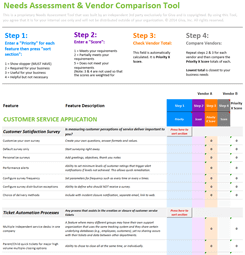30 Excellent Customer Service Values with Examples and Strategies for Developing Your Own
At the center of outstanding customer service lie core values that guide interactions with customers and shape the overall service experience.
In this article, we offer 30 excellent customer service values that can benefit any customer-related organization. These values can help build meaningful customer relationships and sustainable business growth.
Additionally, we give strategies for businesses to develop their own set of customer service values, aligning them with their unique mission, culture, and customer expectations.

What Are Customer Service Values?
Customer service values are guiding principles and beliefs that define the behaviors, attitudes, and actions of individuals and organizations when interacting with customers. By shaping how businesses engage with customers, ideally they build trust, and increase satisfaction and loyalty. Adhering to them can also demonstrate a commitment to being customer-centric.
30 Excellent Customer Service Values
With the following, we offer a list of customer service values, most with examples of the value in action, that can be used in helping create a top-notch customer service environment:
-
Empathy
What it is: Understanding and sharing the feelings of customers.
Why this is important: It can help build trust and rapport. This can lead to stronger relationships and better problem-solving.
Example: "I understand how frustrating it can be to deal with technical issues. Let's work together to resolve this."
-
Respect
What it is: Treating all customers with dignity and consideration.
Why this is important: It can create a positive environment where customers feel valued and appreciated. This can enhance loyalty and customer satisfaction.
Example: "Thank you for bringing this matter to our attention. Your feedback is valued and respected."
-
Patience
What it is: Remaining calm and composed, even in challenging situations, demonstrates respect for customers' time and concerns.
Why this is important: It can lead to clearer communication and more effective resolution of issues.
Example: "I appreciate your patience while I investigate this issue further."
-
Active Listening
What it is: Paying full attention to customers and acknowledging their concerns indicates that their opinions and needs are valued.
Why this is important: It can help build trust and allow for more accurate problem-solving.
Example: "I hear your frustration, and I'm here to help find a solution."
-
Transparency
What it is: Being open and honest with customers about products or services.
Why this is important: It can increase credibility and trust with customers. This can help reduce misunderstandings and enhance long-term relationships.
Example: "Let me clarify our refund policy so you know exactly what to expect."
-
Responsiveness
What it is: Promptly addressing customer inquiries or issues.
Why this is important: It can demonstrate attentiveness and commitment to customer satisfaction. This can help improve overall service experience.
Example: "Thank you for reaching out. I'll look into this right away and get back to you."
-
Professionalism
What it is: Conducting oneself with integrity and courtesy at all times.
Why this is important: It can instill confidence in customers. This in turn can enhance the reputation of the business.
Example: "I apologize for the inconvenience caused. Rest assured, we'll work with you to resolve this issue right away."
-
Flexibility
What it is: Adapting to the unique needs and preferences of customers.
Why this is important: It can show a commitment to customers personally. This can help improve customer satisfaction and loyalty.
Example: "Let me know if there's a specific time that works best for you, and I'll schedule a call accordingly."
-
Knowledgeability
What it is: Possessing in-depth knowledge about products or services.
Why this is important: : It can also instill confidence in customers and enable more effective assistance. This can lead to quicker issue resolution and enhanced trust.
Example: "Based on your requirements, our premium package which offers additional features can provide you greater flexibility."
-
Being Proactive
What it is: Anticipating customer needs and providing assistance before they ask.
Why this is important: It can demonstrate dedication and foresight. This can enhance customer satisfaction and loyalty.
Example: "I noticed you were interested in our new product. Here's a detailed overview to help you learn more."
-
Gratitude
What it is: Expressing appreciation for customers' business and loyalty.
Why this is important: It can strengthen the relationships between the business and its customers. This can then bring more loyalty and positive word-of-mouth.
Example: "Thank you for choosing our service. We truly value your support."
-
Efficiency
What it is: Resolving customer issues quickly and effectively.
Why this is important: It can save customers time and effort. This also in turn can lead to greater satisfaction and loyalty.
Example: "I'll escalate your issue right away to ensure your request is handled promptly."
-
Consistency
What it is: Providing a uniform level of service across all interactions.
Why this is important: It can also create confidence in customers and build trust in the brand. This also can lead to enhanced loyalty and positive reputation.
-
Friendliness
What it is: Creating a welcoming and positive atmosphere for customers.
Why this is important: It can promote positive interactions and enhance the overall customer experience.
Example: "Welcome back! It's great to see you again. How can I assist you today?"
Learn more about friendly customer service.
-
Adaptability
What it is: Adjusting communication styles to suit different customer personalities.
Why this is important: It can improve understanding and rapport. This can lead to more effective interactions.
Example: "Some customers prefer email updates, while others prefer phone calls. How would you like to stay informed?"
-
Integrity
What it is: Acting ethically and honorably in all customer interactions.
Why this is important: It can build trust and credibility. This can help create long-term customer relationships.
Example: "I assure you that your personal information is handled with the utmost confidentiality."
-
Attention to Detail
What it is: Noticing small nuances and addressing them.
Why this is important: It can demonstrate care and thoroughness. This can then lead to more of a sense of personalized service and further enhanced satisfaction.
Example: "I've made a note of your preferred shipping address for future orders."
-
Ownership
What it is: Taking responsibility for resolving customer issues from start to finish.
Why this is important: It can build trust and confidence in the business. This also can enhance customer satisfaction and loyalty.
Example: "I will personally ensure that this matter is resolved to its completion and your satisfaction."
-
Clarity
What it is: Communicating clearly and concisely to avoid misunderstandings.
Why this is important: It can reduce misunderstandings and enhance the overall customer experience.
Example: "I would like to make sure that you are aware that the warranty covers manufacturing defects for up to one year."
-
Follow-Up
What it is: Checking in with customers after a resolution to ensure satisfaction.
Why this is important: It can show care and commitment to their satisfaction. This once again can build loyalty and positive word-of-mouth.
Example: "I wanted to follow up and make sure everything is working smoothly for you now."
-
Problem-Solving
What it is: Finding creative solutions to address customer challenges.
Why this is important: It can indicate dedication and resourcefulness. This also can enhance customer satisfaction and loyalty.
Example: "Let me escalate this issue right now so we can find a quick workaround."
-
Personalization
What it is: Tailoring interactions to reflect individual customer preferences.
Why this is important: It can bring a sense of connection and loyalty. This can enhance overall customer satisfaction.
Example: "Based on your previous purchases, I thought you might be interested in our new product line."
-
Trustworthiness
What it is: Building trust through consistent reliability and honesty.
Why this is important: It can strengthen customer relationships and create loyalty.
-
Teamwork
What it is: Collaborating with colleagues to deliver seamless customer service.
Why this is important: It can help ensure comprehensive issue resolution and enhance overall service quality.
Example: "I'll loop in our technical team so we address this issue right now."
-
Graciousness
What it is: Handling difficult situations with grace and diplomacy.
Why this is important: It can help maintain positive relationships and enhance overall customer satisfaction.
Example: "I really do understand your frustration, and I appreciate your patience as we work to resolve this."
-
Customer Empowerment
What it is: Providing customers with the tools and resources they need to succeed.
Why this is important: It can create a sense of self-sufficiency, and it can enhance overall satisfaction.
Example: "Here's a step-by-step guide to help you navigate our online platform more effectively."
-
Generosity
What it is: Occasionally going above and beyond to exceed customer expectations.
Why this is important: It shows you appreciate the customer. This can create positive feelings toward the business, and then enhance loyalty and positive word-of-mouth.
Example: "As a thank you for being our customer, we'd like to offer you a complimentary upgrade on your next purchase."
-
Accessibility
What it is: Making oneself available and approachable to customers.
Why this is important: This can help customers feel supported and valued. This can once again enhance overall satisfaction and loyalty.
Example: "Feel free to contact me anytime if you have further questions or concerns."
-
Innovation
What it is: Introducing new ideas or solutions.
Why this is important: It can show a commitment to improvement. This can then enhance the overall customer experience.
Example: "We're excited to announce our latest feature upgrade, designed to make your experience even more streamlined."
-
Appreciation
What it is: Recognizing and acknowledging the value customers bring to the business.
Why this is important: It can strengthen the relationship and thus increase loyalty and positive word-of-mouth.
Example: "We wouldn't be where we are without customers like you. Thank you for your continued support."
Strategies for Building Your Own Customer Service Values List
The following are some ways your organization can build its list of values to better service your customers:
-
Assess Your Organization's Culture
Work to understand the company's mission, vision, and goals. Identify existing values reflected in company culture.
-
Gather Employee Input
Conduct surveys or focus groups to gather insights from frontline staff. Encourage open discussions about the values employees believe are important in customer interactions.
-
Analyze Customer Feedback
Review customer surveys, reviews, and complaints to identify recurring themes or desired qualities in service interactions. Use customer feedback to inform the development of customer service values.
-
Define Key Characteristics
Conduct brainstorming sessions to identify traits or behaviors that align with the organization's culture and customer service goals. Prioritize key characteristics that reflect the desired customer service experience.
-
Draft and Refine the List of Values
Write out concise statements that capture each identified value. Solicit feedback from employees and stakeholders to refine the list of values.
-
Communicate and Implement the Values
Introduce the finalized list of values to employees through training sessions or internal communications. Integrate them into performance evaluations, recognition programs, and daily operations.
Key Takeaways: Strong Customer Service Values for a Customer-Centric Business
Customer service values are an integral part of any customer service organization. Finding the right values for any business and their customers is an important exercise. And then, it is important to create an organizational environment where those values are encouraged and implemented. These all will contribute to the overall success of the customer service organization, and then the business itself.
The right values in customer service can build strong customer relationships, enhance satisfaction, and differentiate themselves in the marketplace. Moreover, these values can also pave the way for sustained business growth and prosperity in today's competitive landscape.
Track Customer Issues With Giva's Customer Service Software
Maintain the highest level of support with Giva's Customer Service Software in the Cloud with these features:
- Giva allows you to start quickly with ticketing and then move to: knowledgebase, end user self-service portal, and customer satisfaction surveys/success center.
- Giva has an intuitive design: Low training costs and start-up time.
- No coding, programming or consultants required.
- Giva has the best real-time custom reporting and KPIs: Full color charts and graphs.
- You can create, save, share and schedule delivery of standard and custom reports.
Start your free trial of Giva today!





